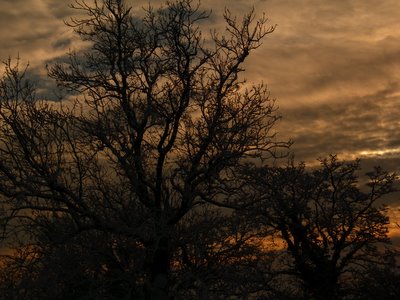For the last couple of years, the Militant Pine Marten has been conscious of a growing climate of fear or at least of anxiety in the West. This is possibly true elsewhere also, but as I have no real first hand knowledge of the collective emotional state of the developing world (and even that statement assumes that such a tremendously sweeping generalisation could ever have any value), I'll leave it aside for the purposes of this discussion. At first glance, it would appear that a high proportion of some of the most important problems facing our societies at the moment are to a great extent due to variations on the theme of fear being played in the background. I'm not referring here to intestine-knotting terror of course, just to the low-intensity highly pervasive forms of this most primal and debilitating of emotions. A good example would be what happens when you're walking down the street at dusk and a bunch of swaggering teenage boys in hoodies are walking down the same pavement towards you. Maybe you cross the road. Maybe you just avoid eye contact. Maybe you just decide to put on a blank facial expression, gird up your loins and walk through them. Whatever your reaction, you're slightly scared that their intentions are hostile, and you perceive a threat to some degree. Meanwhile, despite your best efforts to conceal it, the boys in question have perceived that you perceive them as a threat, which makes them feel that maybe they should be a threat, even if it isn't clear why, and anyway since you're clearly hostile to them, the chances are that they should indeed be hostile towards you. Suddenly, collective paranoia and prejudice has spawned a real antipathy. It's irrational, it comes out of nowhere, but the thought that there could be a threat leads to fear, that fear leads to suspicion, and in turn that generates a threat that has no logical reason to exist.
That example happens in some form a million times every day, in Tube stations on London, outside Virgin Megastore on the Champs Elysées, everywhere, and it may seem innocuous enough, but it's one of the main causes of the much larger problem that in France is termed "l'insécurité", the widespread fear of crime, which is generally far greater than the actual prevalence of crime justifies. But this pervasive climate of fear is too tempting not to be exploited by politicians such as the Militant Pine Marten's betes noires Charles Clarke and Nicolas Sarkozy to introduce rafts of illiberal legislation to protect us or rather alleviate our collective fears, and of course on a larger scale it provided Bush and Blair with the means to persuade their electorates that they should be allowed to start a war. Exploiting collective fears in order to further one's agenda is hardly a new political trick. Indeed, just talking about it fuels the fear, which affords the Powers That Be greater freedom to pursue their goals, and the process is self-perpetuating.
However great tides of fear come and go, they can be dispelled quite easily, people can stand back, take stock, shake their heads and wake up. Underlying all that there remains, I think, a more discreet and yet powerful collective emotion that leads to division, apathy, hostility, and of course fear and violence: increasingly, people lack hope, and without hope it is almost impossible to try and improve anything either for oneself or for society and the world at large. Not believing that things are likely to improve leads to entrenchment and withdrawal. Returning to a theme dear to my mustelid heart, I believe that this is why the French electorate rejected to draft EU constitution last year. Surveys show that better off voters were professionally, and the higher their level of education, the more likely they were to vote in favour of the Constitution. Conversely, those lower in the pecking order tended to oppose it. However this had nothing to do with traditional divisions between Right and Left, Europhiles and Anti-Europeans. This was a difference of opinion between the Hopes and Hope Nots. People are worried by the fact that the EU opens up its member states with uncertain consequences. and whereas those in higher socio-professional groups feel ready to deal with whatever this form of globalisation may bring, those lower down want to protect their current status by turning inwards (these are generalisations of course). For the same reason, successive French governments have found it impossible to introduce meaningful reforms to the welfare system and employment legislation: most of the electorate has no expectation that the risks will lead to any improvements so they cling on to what they have.
This immobilism through loss of hope is by no means unique to France. In the UK for example, it's behind the fact that most younger members of the electorate don't bother to turn up at the polling station: they don't believe that they can change anything. If you're in the habit of not bothering to dispose of glass bottles in the recycling bin provided by the council because you think "what difference will I make on my own?", it's the same thing. Some of the worst culprits are the environmental miserabilists who have set about convincing us all that we're all going to die poisoned by radiation and drowned in melted ice caps, starved because we've eaten all the cod and bonobos. Their attitude indicates that for all their pious pontificating, they've actually given up any real hope of doing anything about it, making it all more likely that theirs are self-fulfilling prophecies. They've left all the hope to those who think that we can carry strip-mining Creation and that it will all turn out fine in the end (which it might, but it's unlikely).
What we need now is to break out of the cycle of hopelessness, despondency and self-fulfilling miserable predictions. It may be quite likely that things will end badly, but it's absolutely certain that they will be awful if no one tries to make a difference because they've given up believing that they can. Social justice isn't just about giving to the Have-nots. It's just as important to return hope to the Hope-nots.
"On aura une maison
Avec des tas d'fenetres
Et si c'est pas sur
C'est quand meme peut-etre"
Jacques Brel










